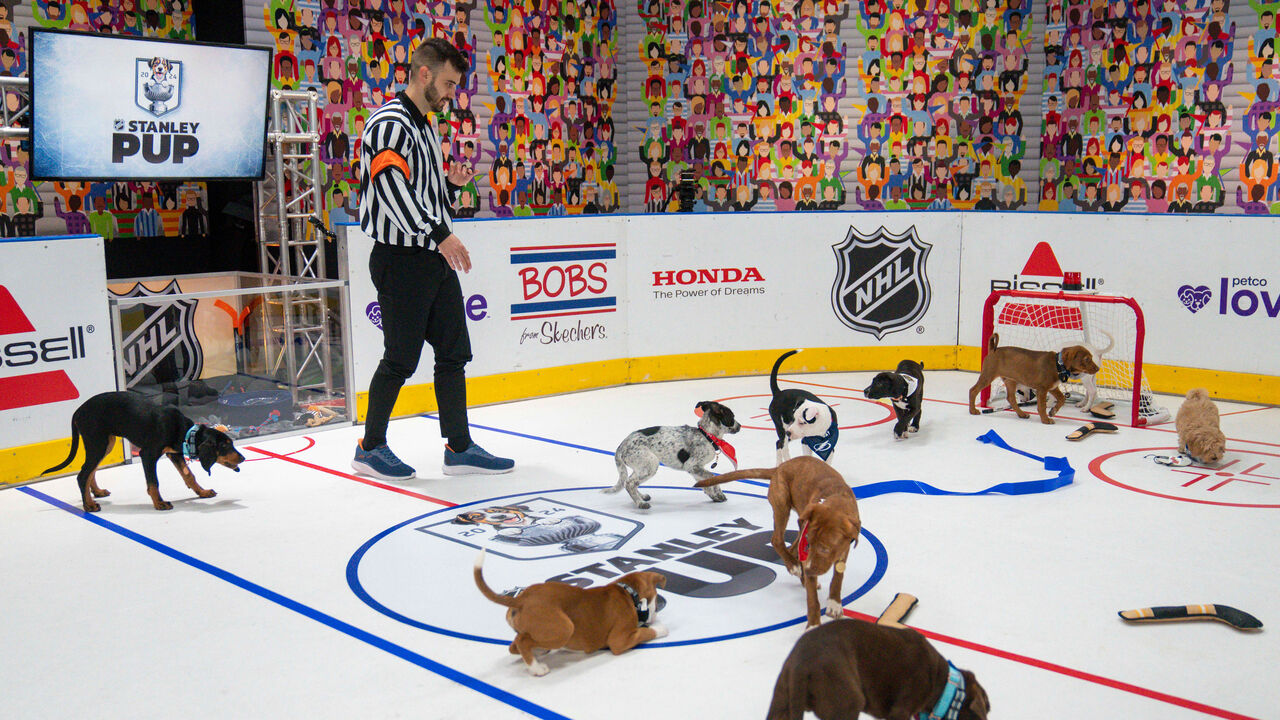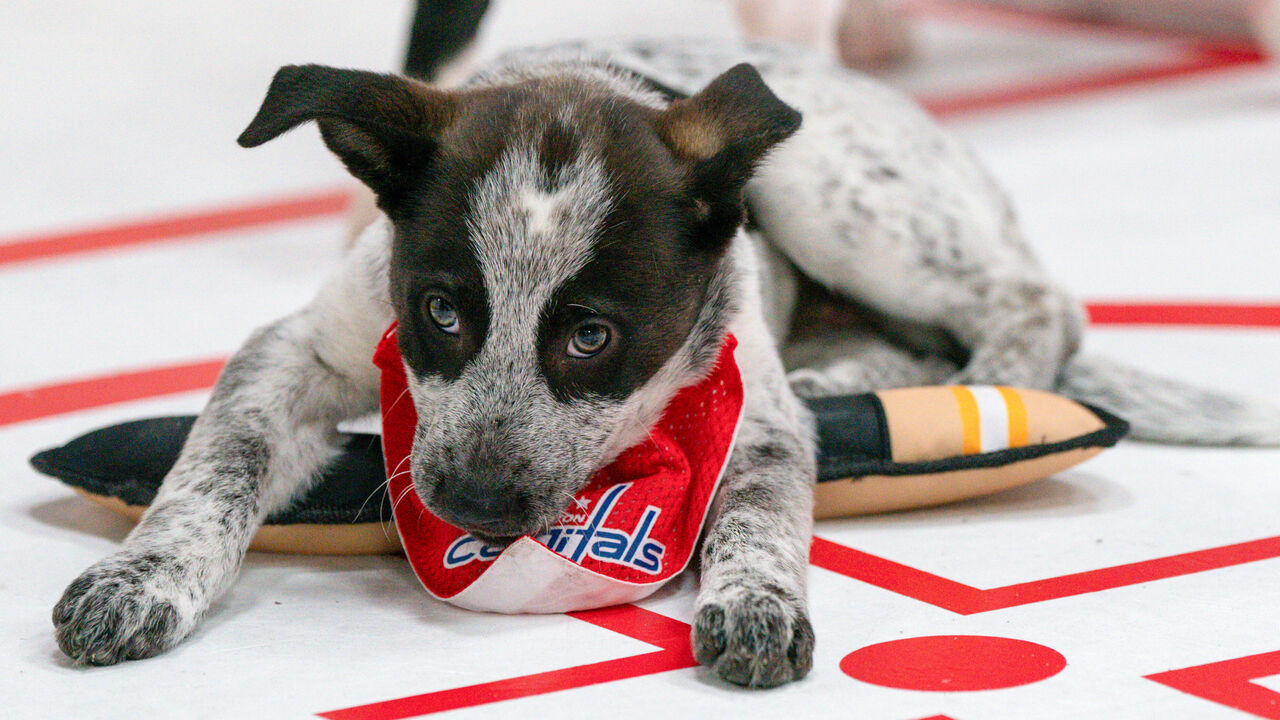You've heard of football's Puppy Bowl; now get ready for hockey's version: the Stanley Pup. It seems the play on words was just too hard to resist for the NHL, which will host its version of a rescue dog competition featuring not only canine stars but players like Nick Suzuki and Anze Kopitar and coach John Tortorella.
"It's really entertaining, there are lots of puns, but it's a great show, and I think people will enjoy the entertainment," said Matt Nicholson, the NHL's vice president of production and creative development.
The executive admitted there were a few natural stars among the 16 dogs representing NHL clubs, saying, "All the pups are great, but I think everyone might find Roman Yorkie super, super cute."
Nicholson added: "Nikita Poocherov also put on a show. And we'll see if people think Connor McDoodle has good stuff."
The move is more than just a gimmick by the NHL and fits into its fan-development strategy. Recent polling suggests at least one in three members of Gen Z - defined as between the ages of 13 and 25 - don't watch live sports and consume the game "through a different lens," as NHL chief marketing officer Heidi Browning previously told theScore.
The Stanley Pup broadcast will try to deliver on the idea of letting fans learn more about the league's players off the ice. "If (a player is) holding a 10-week puppy, they obviously let their guard down and get to talk about something that they're passionate about," Nicholson said.
The Stanley Pup isn't the only initiative launched with fan engagement in mind. The league also announced it's airing alternative Stanley Cup Final broadcasts in American Sign Language, a first for a major North American sport. Deaf play-by-play and color commentators will call the games as they see them rather than providing translations of the spoken calls. The broadcasts will be available through ESPN+ and Sportsnet+.
"There's a little bit of strategy there. And there's a little bit of … let's make our fans happy across all spectrums," Nicholson said.

The Stanley Pup airs Friday at 8 p.m. ET on NHL Network and ESPN+ in the U.S. and Saturday at 6 p.m. ET on Sportsnet in Canada.
theScore caught up with Nicholson to ask about the strategy behind the Stanley Pup and the art of working with puppies.
This interview has been edited for length and clarity.
theScore: What inspired the idea to host a Stanley Pup competition? Did you watch the Puppy Bowl and want to do something similar?
Nicholson: It was an idea we had a couple of years ago. ... The league has done a lot of work with rescue organizations, the teams do a lot of work with dogs, whether it's seeing-eye dogs or team dog calendars, and it just made sense. Subconsciously, possibly (the NFL's Puppy Bowl factored in), but we didn't want to copy them. You know - Stanley Cup, Stanley Pup, it kind of just works.
How does this fit into the league's efforts to remain relevant in an increasingly competitive North American professional sports landscape?
Nicholson: The Stanley Cup is certainly the greatest trophy in sports. And whenever we can do something to get our players in front of different fans, we take the opportunity. We've learned that there are hockey fans out there, whether they're also baseball fans or WWE or NASCAR fans. When we get an opportunity to get a show on ESPN+ or Sportsnet that's not only doing good but can build us some fans right before an amazing final with these two teams, it's something that's a no-brainer for us.
Fans are always asking for more personality from hockey players, how does this achieve that?
Nicholson: It's just tough not to show personality when you have players holding puppies. There are plenty of other sports where their players are not as outgoing as maybe the league would hope, but I think our players do a great job. They're starting to build their social media platforms, and the players we asked, especially from the (Washington) Capitals, were generous in giving their time.

Tell me about the process of putting the show together.
Nicholson: It's a show with puppies, and you can only direct them so much. Puppies operate on their own schedule. They sleep when they want, they go to the bathroom when they want. That's the joy of it. It's unscripted. The true competition is the puppies having fun, and you just see what you get from that. We created presentations for how they enter the ice or the rink. We did puppy cards for all of them. So yeah, you operate on their schedule. It's not like a Hollywood production - we're going to take a lunch break when they want.
A lot of it is just the enjoyment, seeing what the puppies can do. And then you create the program around it, and you do some features showcasing all the pups. There's something satisfying about getting a rescue and saving that life. There's a line in the show that says, "When you adopt a rescue dog, you actually save two dogs because there is another dog that's going to take his spot in a second."
I know that Tortorella makes a special appearance on the show. He has a special passion for rescue dogs, doesn't he?
Nicholson: He has his own foundation. He tells the story in the show, and I'm not going to ruin it. His family went to a rescue organization, and it impacted him greatly because he didn't really know what was going on with rescue dogs prior to that. Then, all of a sudden, realizing that these dogs are being put down, it just became a passion project of his.
Do you think this will become an annual NHL tradition?
Nicholson: I don't want to say we're completely looking ahead to next season, but we hope this is something that continues. We have ideas on how to make it bigger and better next year. We already had some teams reach out and ask, 'How can we participate in this?' It would be amazing if this becomes a franchise for us.
Jolene Latimer is a features writer at theScore.
Copyright © 2024 Score Media Ventures Inc. All rights reserved. Certain content reproduced under license.